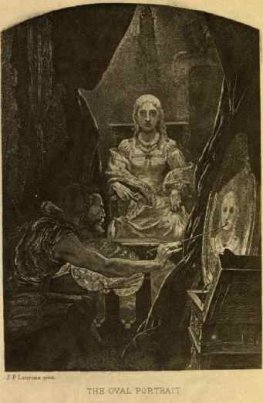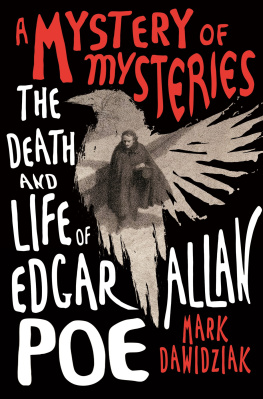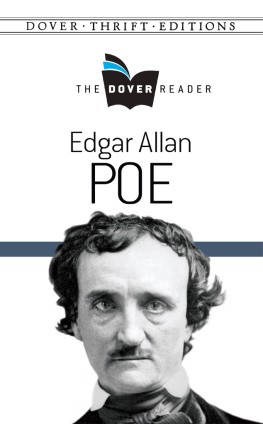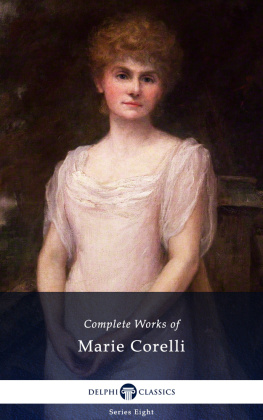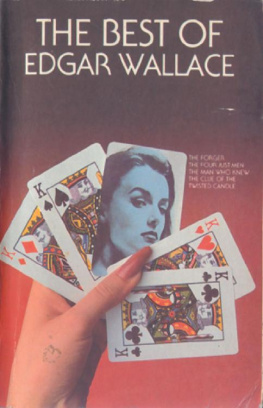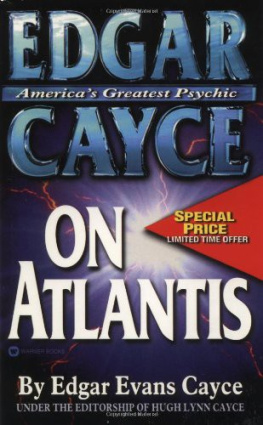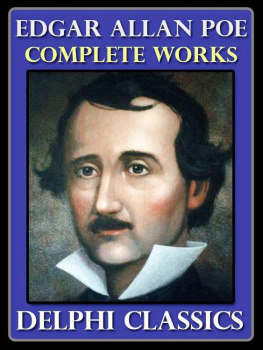Edgar Poe - The Mystery of Marie Rogêt
Here you can read online Edgar Poe - The Mystery of Marie Rogêt full text of the book (entire story) in english for free. Download pdf and epub, get meaning, cover and reviews about this ebook. genre: Prose / Detective and thriller. Description of the work, (preface) as well as reviews are available. Best literature library LitArk.com created for fans of good reading and offers a wide selection of genres:
Romance novel
Science fiction
Adventure
Detective
Science
History
Home and family
Prose
Art
Politics
Computer
Non-fiction
Religion
Business
Children
Humor
Choose a favorite category and find really read worthwhile books. Enjoy immersion in the world of imagination, feel the emotions of the characters or learn something new for yourself, make an fascinating discovery.

- Book:The Mystery of Marie Rogêt
- Author:
- Genre:
- Rating:5 / 5
- Favourites:Add to favourites
- Your mark:
- 100
- 1
- 2
- 3
- 4
- 5
The Mystery of Marie Rogêt: summary, description and annotation
We offer to read an annotation, description, summary or preface (depends on what the author of the book "The Mystery of Marie Rogêt" wrote himself). If you haven't found the necessary information about the book — write in the comments, we will try to find it.
The Mystery of Marie Rogêt — read online for free the complete book (whole text) full work
Below is the text of the book, divided by pages. System saving the place of the last page read, allows you to conveniently read the book "The Mystery of Marie Rogêt" online for free, without having to search again every time where you left off. Put a bookmark, and you can go to the page where you finished reading at any time.
Font size:
Interval:
Bookmark:
The Mystery of Marie Rogt
by Edgar Allan Poe
Es giebt eine Reihe idealischer Begebenheiten, die der Wirklichkeit parallel lauft. Selten fallen sie zusammen. Menschen und zufalle modifieiren gewohulich die idealische Begebenheit, so dass sie unvollkommen erscheint, und ihre Folgen gleichfalls unvollkommen sind. So bei der Reformation; statt des Protestantismus kam das Lutherthum hervor.
There are ideal series of events which run parallel with the real ones. They rarely coincide. Men and circumstances generally modify the ideal train of events, so that it seems imperfect, and its consequences are equally imperfect. Thus with the Reformation; instead of Protestantism came Lutheranism.
Novalis. Moral Ansichten.There are few persons, even among the calmest thinkers, who have not occasionally been startled into a vague yet thrilling half-credence in the supernatural, by coincidences of so seemingly marvellous a character that, as mere coincidences, the intellect has been unable to receive them. Such sentimentsfor the credences of which I speak have never the full force of thoughtsuch sentiments are seldom thoroughly stifled unless by reference to the doctrine of chance, or, as it is technically termed, the Calculus of Probabilities. Now this Calculus is, in its essence, purely mathematical; and thus we have the anomaly of the most rigidly exact in science applied to the shadow and spirituality of the most intangible in speculation.
The extraordinary details which I am now called upon to make public, will be found to form, as regards sequence of time, the primary branch of a series of scarcely intelligible coincidences, whose secondary or concluding branch will be recognized by all readers in the late murder of Mary Cecila Rogers, at New York .
When, in an article entitled "The Murders in the Rue Morgue," I endeavored, about a year ago, to depict some very remarkable features in the mental character of my friend, the Chevalier C. Auguste Dupin, it did not occur to me that I should ever resume the subject. This depicting of character constituted my design; and this design was thoroughly fulfilled in the wild train of circumstances brought to instance Dupin's idiosyncrasy. I might have adduced other examples, but I should have proven no more. Late events, however, in their surprising development, have startled me into some farther details, which will carry with them the air of extorted confession. Hearing what I have lately heard, it would be indeed strange should I remain silent in regard to what I both heard and saw so long ago.
Upon the winding up of the tragedy involved in the deaths of Madame L'Espanaye and her daughter, the Chevalier dismissed the affair at once from his attention, and relapsed into his old habits of moody reverie. Prone, at all times, to abstraction, I readily fell in with his humor; and, continuing to occupy our chambers in the Faubourg Saint Germain, we gave the Future to the winds, and slumbered tranquilly in the Present, weaving the dull world around us into dreams.
But these dreams were not altogether uninterrupted. It may readily be supposed that the part played by my friend, in the drama at the Rue Morgue, had not failed of its impression upon the fancies of the Parisian police. With its emissaries, the name of Dupin had grown into a household word. The simple character of those inductions by which he had disentangled the mystery never having been explained even to the Prefect, or to any other individual than myself, of course it is not surprising that the affair was regarded as little less than miraculous, or that the Chevalier's analytical abilities acquired for him the credit of intuition. His frankness would have led him to disabuse every inquirer of such prejudice; but his indolent humor forbade all farther agitation of a topic whose interest to himself had long ceased. It thus happened that he found himself the cynosure of the policial eyes; and the cases were not few in which attempt was made to engage his services at the Prefecture. One of the most remarkable instances was that of the murder of a young girl named Marie Rogt.
This event occurred about two years after the atrocity in the Rue Morgue. Marie, whose Christian and family name will at once arrest attention from their resemblance to those of the unfortunate "cigar-girl," was the only daughter of the widow Estelle Rogt. The father had died during the child's infancy, and from the period of his death, until within eighteen months before the assassination which forms the subject of our narrative, the mother and daughter had dwelt together in the Rue Pave Saint Andre; was not unaware of the advantages to be derived from the attendance of the fair Marie in his perfumery; and his liberal proposals were accepted eagerly by the girl, although with somewhat more of hesitation by Madame.
The anticipations of the shopkeeper were realized, and his rooms soon became notorious through the charms of the sprightly grisette . She had been in his employ about a year, when her admirers were thrown into confusion by her sudden disappearance from the shop. Monsieur Le Blanc was unable to account for her absence, and Madame Rogt was distracted with anxiety and terror. The public papers immediately took up the theme, and the police were upon the point of making serious investigations, when, one fine morning, after the lapse of a week, Marie, in good health, but with a somewhat saddened air, made her re-appearance at her usual counter in the perfumery. All inquiry, except that of a private character, was of course immediately hushed. Monsieur Le Blanc professed total ignorance, as before. Marie, with Madame, replied to all questions, that the last week had been spent at the house of a relation in the country. Thus the affair died away, and was generally forgotten; for the girl, ostensibly to relieve herself from the impertinence of curiosity, soon bade a final adieu to the perfumer, and sought the shelter of her mother's residence in the Rue Pave Saint Andre.
It was about five months after this return home, that her friends were alarmed by her sudden disappearance for the second time. Three days elapsed, and nothing was heard of her. On the fourth her corpse was found floating in the Seine,
The atrocity of this murder, (for it was at once evident that murder had been committed,) the youth and beauty of the victim, and, above all, her previous notoriety, conspired to produce intense excitement in the minds of the sensitive Parisians. I can call to mind no similar occurrence producing so general and so intense an effect. For several weeks, in the discussion of this one absorbing theme, even the momentous political topics of the day were forgotten. The Prefect made unusual exertions; and the powers of the whole Parisian police were, of course, tasked to the utmost extent.
Upon the first discovery of the corpse, it was not supposed that the murderer would be able to elude, for more than a very brief period, the inquisition which was immediately set on foot. It was not until the expiration of a week that it was deemed necessary to offer a reward; and even then this reward was limited to a thousand francs. In the mean time the investigation proceeded with vigor, if not always with judgment, and numerous individuals were examined to no purpose; while, owing to the continual absence of all clue to the mystery, the popular excitement greatly increased. At the end of the tenth day it was thought advisable to double the sum originally proposed; and, at length, the second week having elapsed without leading to any discoveries, and the prejudice which always exists in Paris against the Police having given vent to itself in several serious meutes , the Prefect took it upon himself to offer the sum of twenty thousand francs "for the conviction of the assassin," or, if more than one should prove to have been implicated, "for the conviction of any one of the assassins." In the proclamation setting forth this reward, a full pardon was promised to any accomplice who should come forward in evidence against his fellow; and to the whole was appended, wherever it appeared, the private placard of a committee of citizens, offering ten thousand francs, in addition to the amount proposed by the Prefecture. The entire reward thus stood at no less than thirty thousand francs, which will be regarded as an extraordinary sum when we consider the humble condition of the girl, and the great frequency, in large cities, of such atrocities as the one described.
Font size:
Interval:
Bookmark:
Similar books «The Mystery of Marie Rogêt»
Look at similar books to The Mystery of Marie Rogêt. We have selected literature similar in name and meaning in the hope of providing readers with more options to find new, interesting, not yet read works.
Discussion, reviews of the book The Mystery of Marie Rogêt and just readers' own opinions. Leave your comments, write what you think about the work, its meaning or the main characters. Specify what exactly you liked and what you didn't like, and why you think so.



